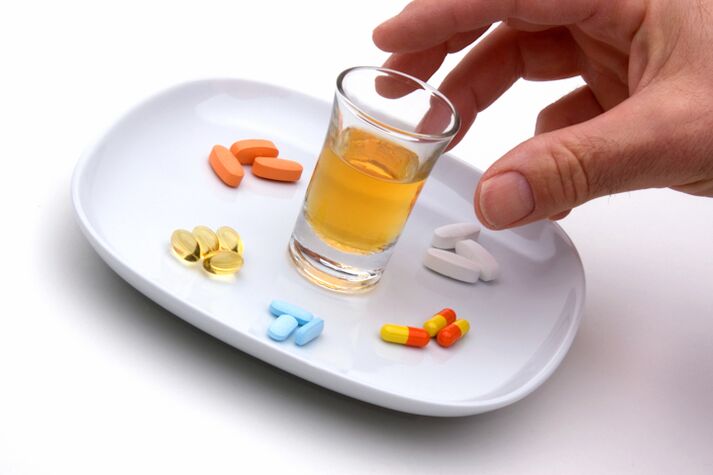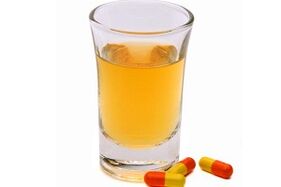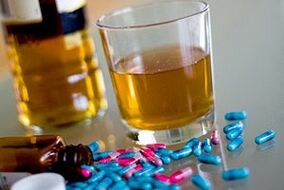Antibiotics are a very necessary drug that saves more than one life, despite a long list of contraindications and numerous side effects. Because only antibiotics in the body can destroy the bacteria that cause dangerous diseases.

Many people died of bacterial infections a few days before these drugs were invented. Due to the lack of such drugs, many diseases were considered incurable.
Antibiotics should not be taken without a doctor's prescription, and it is important to follow the instructions. In addition, you should know that antibiotics are not compatible with alcohol. This article answers all the questions related to taking antibiotics.
Antibiotic rules
The most important rule for taking antibiotics is to use them only in cases where it is impossible to carry without them. Instructions for use are symptoms of an acute bacterial infection that the body cannot cope with on its own. Taking antibiotics to achieve the desired therapeutic effect cannot be discriminatory.
It is important to follow the instructions below:
- You cannot prescribe an antibiotic yourself without medical education. Only a doctor will be able to determine the cause of the disease - a virus or a bacterium. Antibiotics do not help with viral infections, on the contrary, they can aggravate the course of the disease;
- If you feel well, you can not stop the prescribed course of treatment. Recurrence of the disease may occur;
- Do not change the antibiotic dose during treatment. A decrease in dosage threatens the bacterium's resistance to the drug, and the increase occurs with side effects or overdose;
- You can not take antibiotics with tea, fruit juice and especially milk, otherwise it will be useless to take the drug. Milk, milk and fermented milk products are not compatible with antibiotics, reducing the effect of the drug. You can take the drug only with water, about 0, 5-1 glasses;
- You cannot take antibiotics at any time. It is important to follow the instructions for the drug and use the drug as described: before, during or after meals. In addition, it is important to monitor the frequency of application (1 time in 24 hours, 2 times in 12 hours, 3 times in 8 hours, etc. ), to establish the desired antibiotic concentration in the body;
- Do not combine antibiotic intake with physical activity;
- You cannot drink alcohol while taking antibiotics.

It is important to inform your doctor before prescribing antibiotics:
- medications currently taken;
- pregnancy or lactation;
- kidney or liver disease;
- diabetes.
Also if observed earlier:
- occurrence of side effects;
- development of allergic reactions;
- end use of antimicrobial agents.
When can I drink alcohol after completing the antibiotic course?
Different antibiotics have different active ingredients. And therefore, every drug has conditions for elimination from the body. In one case, this is a short period of time, and alcohol can be taken in the morning, and in another, it is necessary to abstain from alcohol for 7 days.
The necessary information is usually indicated in the manufacturer's statement of readiness. If not, it is preferable to wait 10 days. In addition, if the patient has problems with the kidneys or liver, this period should be at least doubled.
How long after alcohol can you take antibiotics?
Alcohol is completely eliminated from the body 21 hours after the last intake. After this period, you can take prescribed antibiotics. However, in any case, if you take a course, it is better to reduce alcohol consumption as much as possible.
Causes of incompatibility of alcohol and antibiotics
Taking antibiotics significantly overloads the kidneys and liver, and taking them with alcohol only aggravates the situation, because ethanol slows down the excretory system, there is another important reason for incompatibility.
All the substances that enter the human body begin to break down until only the original parts remain. This also happens with alcohol and antibiotics. The danger of co-administration is that the antibiotic molecules resemble alcohol molecules. The body does not recognize it properly, which leads to failure.
Alcohol is perceived by the body as a drug, which leads to the incorrect processing of alcohol molecules by the body.
Consequences of not following the rules of taking antibiotics
Undesirable side effects often occur in case of violation of the rules of taking antibiotics, as well as with the wrong choice of medication or incorrectly prescribed treatment regimen.
These include:
- Dysbacteriosis. It is caused by a balance between the healthy and pathogenic microflora of the body, which occurs when pathogenic bacteria begin to quantify the bacteria that perform the body's protective functions. Dysbacteriosis manifests itself in the form of candidiasis or recurrent diarrhea.
- Allergic reactions. Individual intolerance to the components of the drug plays an important role here. Allergic reactions are different, including irreversible reactions.
- Antibiotic resistance of bacteria. Pathogens can adapt to the active ingredient of the antibiotic, you just need to release the "catch". They continue to multiply and the disease continues accordingly.
Only a serious approach to the use of antibiotics will give the necessary therapeutic effect.
Which antibiotics are strictly prohibited with alcohol?
There are antibiotics that are strictly forbidden to take at the same time as alcohol. This information, in the description of the drug, of course, the doctor responsible for prescribing antibiotics should inform the patient about it.
These medications include the following antibiotics:
- Tetracycline group. Drugs based on them are often used in medicine, have a wide range of action;
- Chloramphenicol group. This group of drugs often causes side effects and can increase the toxic effects of the drug in combination with alcohol;
- Lincosamides group. Adversely affects the liver and central nervous system when taken concomitantly with alcoholic beverages;
- Group of aminoglycosides. This group of drugs is one of the strongest among antibiotics. Poor compatibility with other drugs other than alcohol
- Cephalosporin group. Co-administration of alcohol causes severe intoxication symptoms in the body, which in turn leads to a severe deterioration in well-being;
- Macrolide group. The combination of alcohol and an antibiotic has a strong toxic effect on the liver and brain;
- Antibiotics used in the treatment of tuberculosis;
- Antibiotics used to treat leprosy.

There are also drugs in the pharmacological market that do not contain information on the interaction with alcohol.
The fact that there is no information about the combination with alcohol does not mean that the combination is allowed. There is no need for the body to be exposed to unnecessary risks.
Possible consequences of a combination of an antibiotic and alcohol
There is no way to know in advance how a particular organism will react to the simultaneous intake of alcoholic fluids and antibiotics. Damage can be done to any part of the body.
However, the most common results are:
- Severe allergic reactions;
- Severe unbearable headache;
- Dizziness;
- Difficulty breathing
- Chest pain, pressing character;
- A sharp increase or decrease in pressure;
- Nausea;
- Excessive sweating;
- Nausea or vomiting;
- Liver damage;
- Aggravated intoxication and hangovers;
- It is necessary to repeat the course of antibiotics. Alcohol will reduce or destroy the effect of the drug.
The consequences can be even more tragic, it all depends on the person and his health. Negative consequences are always the suffering of the body in whole or in part. Adverse effects can be easily avoided by simply removing alcohol along with antibiotics.
It is important to know that only clinical trials currently prove that only a fraction of all antibiotics are compatible with alcohol. The remaining drugs remain in doubt or are not fully understood.
A person must understand the onset of possible outcomes by paying attention to medications that have a pre-learned incompatibility with ethanol. Responsibility for your health should be a priority in the face of all living conditions related to drinking.
And to get the best results from treatment, you need to give up any alcohol, even the weakest.
























